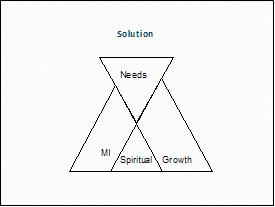What is Foundations?
 Foundations is a new approach to initiating positive change in individuals seeking spiritual guidance. It combines proven counseling techniques within a spiritual framework. A formal training program educates and trains spiritual oriented volunteers under the direction of professional counselors and experienced ministers to become facilitators for change. Foundations is administered under the direction of New Life Church. Sam Brown volunteered his services to assist the outreach department of NLAC during the fall of 2011. By the end of 2012, a team of facilitators had been through training, case studies, and role playing.
Foundations is a new approach to initiating positive change in individuals seeking spiritual guidance. It combines proven counseling techniques within a spiritual framework. A formal training program educates and trains spiritual oriented volunteers under the direction of professional counselors and experienced ministers to become facilitators for change. Foundations is administered under the direction of New Life Church. Sam Brown volunteered his services to assist the outreach department of NLAC during the fall of 2011. By the end of 2012, a team of facilitators had been through training, case studies, and role playing. The goal of initiating a positive change in behavior in a limited number of sessions may seem daunting. Realistically, we see this as a beginning; the cornerstone of what we think is an opportunity for a new life. While not all the targeted population has a substance problem, this is most often a serious obstacle for clients in attempting to turn their life around. For this reason, a focus on substance dependency is a major component of Foundations. The techniques of Motivational Interviewing were chosen as research, such the NIAAA's MATCH project, demonstrates that it can initiate change after one to two sessions.
Substance Treatment conventionally includes participation in a Twelve-Step Program. Foundations focuses on the stage of the client prior to recognizing the need for long term commitment to a treatment program, such as 12-steps. The strengths of the Foundation Facilitator are compassion and spirituality. Foundations applies the strengths of the facilitator towards a non-conformational dialogue. We view a clients committing to a twelve step program as evidence of a success.
Foundations instructs in Christianity and invites a pragmatic discussion on the issues surrounding the client's circumstances. The style of dialogue is Motivational Interviewing, MI for short. MI is a proven counseling style with a 20 year track record. For example, MI is the primary method used by the Veterans Administration in its substance treatment program. There are four components to MI. The first, empathy, is seeing the world as the client sees it. Empathy starts with an accurate positive regard for the client, encourages the flow on information from the client, and increases the motivation of the client to participate.
The second component is to provide non-judgmental reflections on the clients conflict between the reality of the his/her circumstances versus the psychological mechanism of denial. The client is encouraged to recognize the gap between their core values and their behavior. Only as the client begins to appreciate that their behavior is in conflict with their core values can the client then consciously make choices.
The third component, affirmation is the positive reinforcement of change. The fourth component occurs as the client internalizes the need for change. Self-efficacy is the clients belief that change is possible, that the client has the power to achieve a particular outcome through their own behavior.
The capacity to share ones own human defects, shortcomings and struggles is necessary to form an alliance with the client. In a sense, this is proof that the client can offer information without risking judgment. To be effective the facilitator must be willing to open up emotionally, to share pain, to be "Transparent". This is in contrast to a style that is confrontations, and judgmental where an invisible wall separates the facilitator from the client. The reason is simple; research has proven this style has a higher efficacy while a confrontational style increases resistance and motivation to change. A criterion of a facilitator is to possess the spiritual strength to open up themselves and see through the world through the eyes of the client.
The famous psychologist Maslow modeled human needs as a hierarchy moving from more basic needs, water, food, shelter, through social needs, and finally up towards self actualization. The psychologist Victor Frankl a survivor of the Nazi concentration camps added self-transcendence, the need for spiritual experience. Maslow's thinking was that pre-occupation with lower needs interfered with seeking solutions to higher needs. Addressing one's lower needs does not negate one's higher needs. In terms of addiction, the use of a substance results in a mal- adaptive substitution in meeting needs. It is often said that the addictive substance is a substitute for human relationships, the drug or alcohol becomes has become the addicted person's best friend. meeting needs in healthy manner. Foundations illuminates the clients understanding of the inherent conflicts arising from substituting a substance for an authentic religious experience. As the client understands the conflict between an authentic spiritual experience, for us, as a personal relationship with Jesus, and substance use, the client can begin the self-talk that will lead to a willingness to change.
It is true that individuals believe what they say more than what they are told. The component of Affirmation is to mirror back to the client positive self-talk. Another view is that alliance between the facilitator and the client amplifies the resources of the clients own mind. By amplifying the resources of the client's mind, such as seeing an objective image of reality, the client's can now muster internal mental resources to heal.
We use a model where the individual's self, their latent memories, and their consciousness are coordinated towards change. To achieve a level of self-efficacy, self-talk becomes latent memory. As latent memory, the self-talk guides consciousness. Ultimately, the real needs of the self can be recognized, giving rise to pragmatic plans to effect change. The goal is for the client to belief they can change their behavior to fit their own positive core values.
Churches represent a large group of motivated volunteers, talent, and resources. The population of incarcerated people are suffering. As Christians, we know our best actions are those aimed towards relieving human suffering. Christians refer to this as Matthew 25, based on the scriptures making clear that this is the Lord's expectation.
We take Jesus at his word when we visit the least of human beings in jail, we are visiting Him. So for us this is a source of joy. But we wish to go further, to apply the knowledge of modern science to effect positive change to relieve the long term suffering in the individuals we meet. We have a dual purpose, to educate on Scripture and to effect positive change to the best of our ability.
Some of us have experience the crumbling of a life build on sand, when the waves of life's storms washed over our personnel foundations. We are here because we survived those storms, but learned to build our new foundation on rock. For us Christians, our faith in Jesus is that rock. We think that faith is latent on all people; regardless of how far down the ladder they may have fallen. That without a spiritual experience we are defenseless against life's storms.
Empathy can not be taught nor learned in a classroom. Even the most well learned psychologist requires empathy to be an effective therapy. On the other hand, with only basic instruction, individuals with great feeling of empathy can be highly effective. Our Facilitators are not professional counselors. However, scientific research has shown that Motivational Interviewing is effective, provided that the knowledge of the technique is used with nonjudgmental and non- confrontational mindset. Also, MI is used throughout the medical field, often with people with little or no other training in psychology. A key aspect of a facilitator is foregoing the judging of others. This is critical to attaining rapport with individuals who view their lives judged negatively by family, friends, and society. As members of the New Life Church, we are taught and believe that to judge others is wrong.
Facilitators are defined as church members, approved by the authorities, who have completed classes in Motivational Interviewing. In addition the Facilitators attend classes in the basics of substance dependency. The training includes classroom lectures, participation in role playing, readings, and written assignments, and attending open 12 step meetings. In addition, Facilitators receive education in the Bible scriptures that are an integral part of Foundations. The training and follow up is done under the direction of experience professional counselors.
We know that statically there is a high probability that underlying the legal issues of many clients is substance abuse. Denial or rationalization occurs to block the negative feelings from behavior that was in conflict with core values. In the model of psychology termed "stages of change", the client moves from a stage of pre-contemplation to contemplation. In other words, "I don't have a problem" to. "I think I may have a problem" Participation in a religious setting is an opportunity to highlight positive core values. This may be thought of a "flanking movement" around the barriers of denial. Highlighting the core values, the client is motivated to move to the stage of contemplation.
There is a high correlation between a variety of mental disorders and substance abuse. Only highly trained professional are qualified to diagnose mental disorders. The Diagnostic and Statistical Manual V is the standard reference of the medical profession that defines the criterion for substance dependency and all other mental disorders. Pragmatically, an exact assessment and diagnosis seldom is performed in the area of substance dependency. There is simply not enough money or trained personnel.
The reality is that incarceration itself, related to substance abuse is strong evidence that the client suffers from a diagnostic valid substance problem. General practice is that until the client substance dependency is successfully treated, valid diagnosis of a co-morbid mental disorder, i.e. depression is be postponed, as the substance disorder mask or mimic the symptoms of a potential co-morbid disorder.
All psychoactive drugs fall into one of four categories based on their action on the central nervous system. Why some individuals become dependent is a matter of on- going research. There is as yet no clear answer. Federal agencies such as the NIAAA are investigating potential genetic factors related to alcoholism. Regardless of the cause, remission ultimately depends on the client self-efficacy. Substance dependency is considered a chronic condition, there is no cure. The treatment is abstinence to bring on remission of the behavior that leads to relapse.
Foundations seeks a solution. Integrating modern counseling techniques integrated within a Christian framework, we can give clients an opportunity to begin constructing a new life, build on a solid foundation. In an age with minimal funding, a shortage of trained professionals and a large need, this is, can be, and should be, a job that churches can do.
We are reminded that all us need help at some point in our life. As the great psychologist Carl Jung stated as quoted in the Big Book of AA, as 12-step programs have proven, and as many of us have personally experienced, spiritual awaking is life altering. If the clients could have done so on their own, they would have. The challenge is to take the best from mankind's knowledge base of science, and use this knowledge for positive change.








